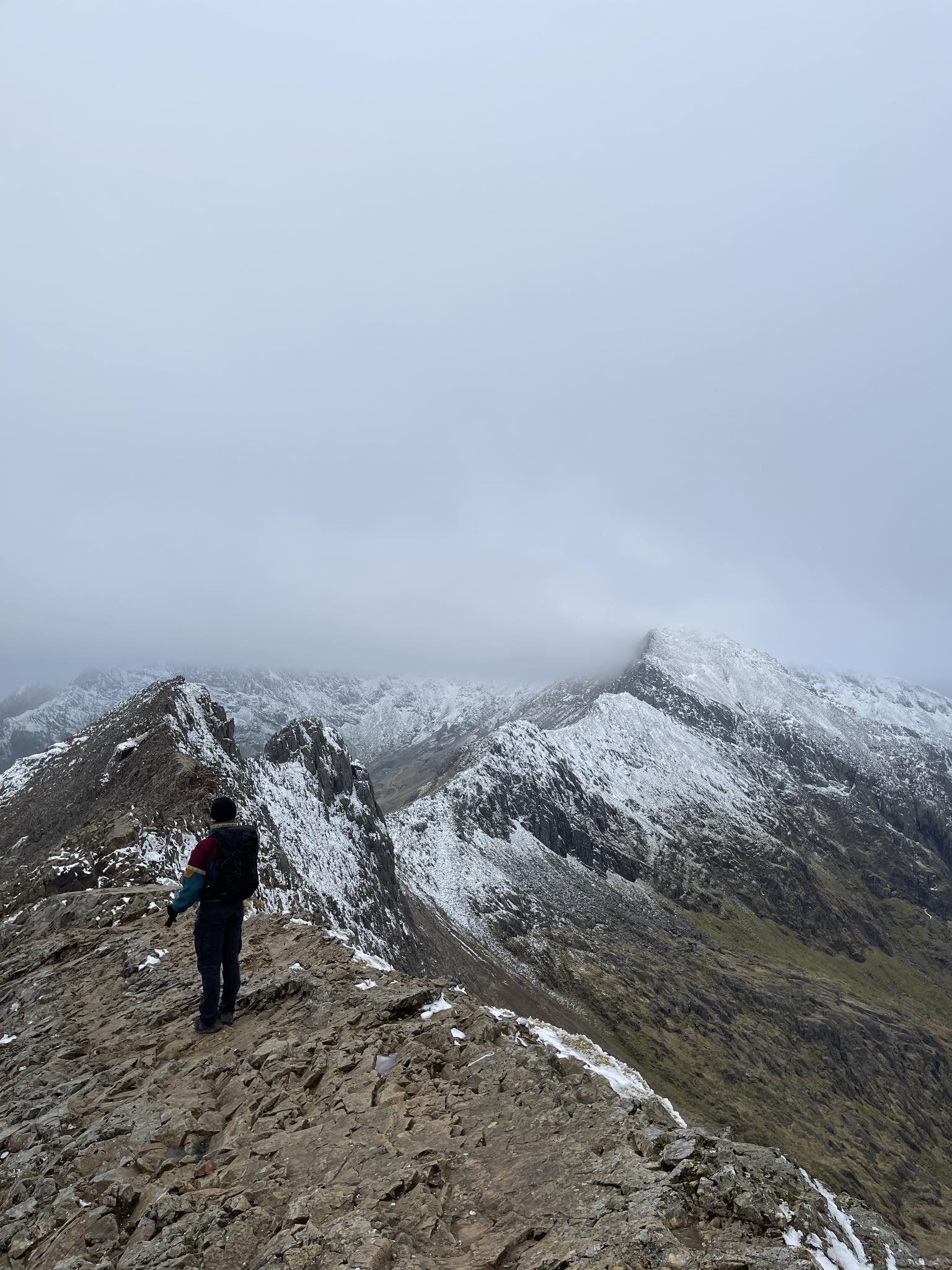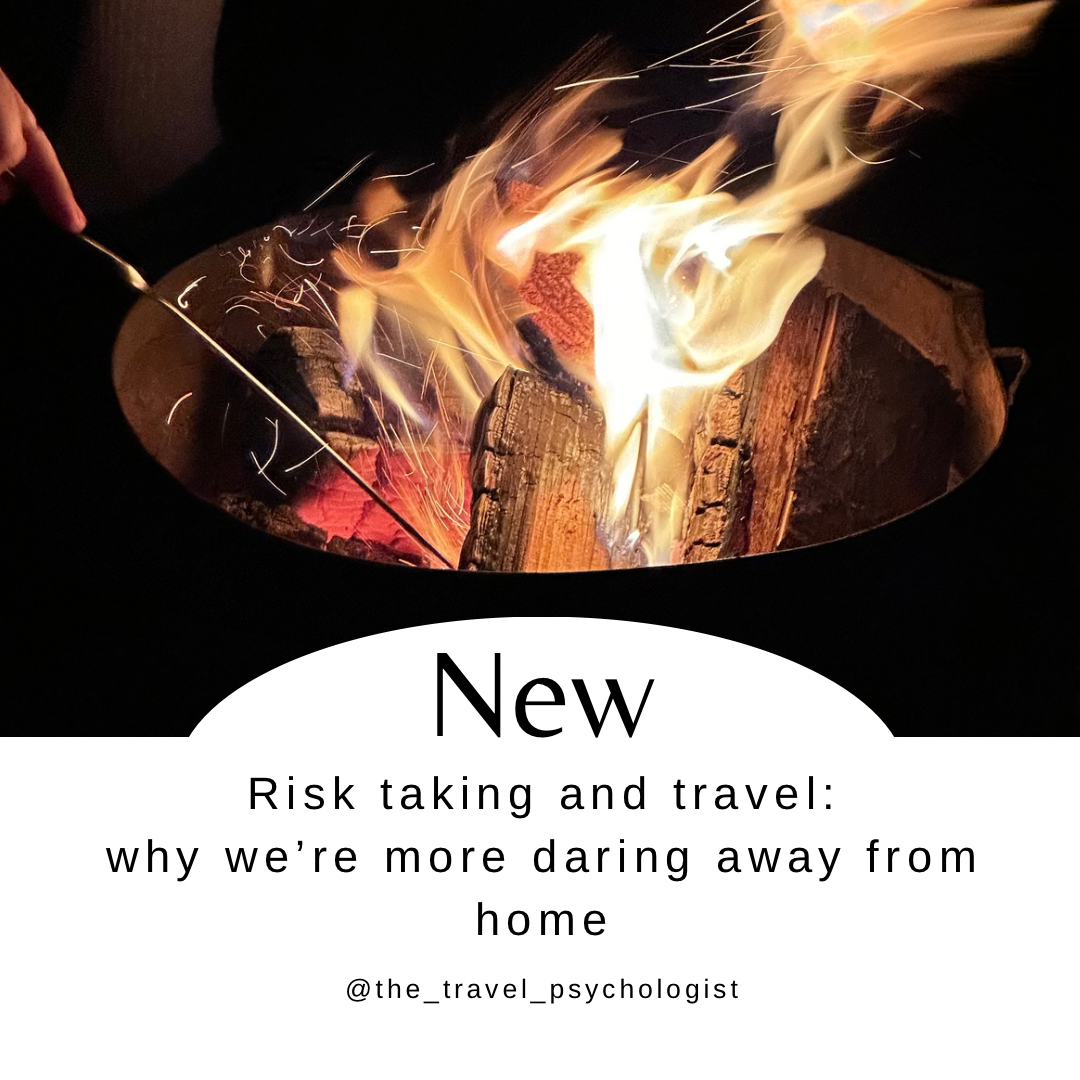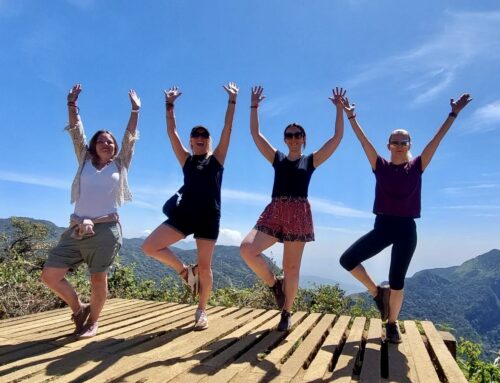Dr Nicola Cann, Educational Psychologist and Regular Contributor
Whilst many of us love a relaxing couple of weeks in a familiar holiday spot, others see holidays as a gateway to new experiences – trying new foods, immersing ourselves in new cultures, and exploring exotic landscapes. For many of us, a successful trip also involves a level of risk-taking that may not come naturally in our day-to-day lives. This tendency to take more risks while on holiday is not just a coincidence; a combination of psychological, social, and environmental factors entice people to behave more boldly than they would at home. Whether it’s parasailing or skinny dipping, or simply trying an unfamiliar local food, we approach risk differently when we’re travelling.
Taking risks while travelling can of course have negative consequences for us and for those around us, but it can also help us to become more adaptable and resourceful, not to mention the lifelong memories created by doing things that are outside of our comfort zone.
So if you want to take more risks while travelling, or want to get better at managing those risks, here’s what you need to know about the psychology behind risk taking while travelling.
Why do we take more risks on holiday?
According to a Contiki survey, 70% of travellers say they are more likely to take risks and accept new challenges while abroad, compared to only 52% of non-travellers. Some of us are just naturally inclined to take more risks, but being in an unfamiliar environment, far from the social norms of your usual surroundings, and away from regular routines, can create a sense of freedom that leads us to behave on holiday in ways we would neve behave at home. But what is driving these changes?
Relaxation and risk taking
On holiday we typically let go of daily stressors and routines. This shift can lower our inhibitions and reduce anxieties. This combination of factors has been associated with higher risk taking behaviours – we’re more likely to try new and riskier things when we’re less stressed out. Researchers have suggested that this could be because we’re happier when we’re on holiday, and when we’re happier we are more optimistic. This optimism leads us to evaluate the outcomes of risks as more positive when we’re on holiday and feeling relaxed (Otto & Eichstaedt, 2018). There’s also evidence to suggest that we’re happier and more optimistic when the weather is sunnier, which is often the case for us when we’re holidaying.
Going hand in hand with holiday relaxation is the increased likelihood that we will be drinking more alcohol than usual. Most of us have different rules about these indulgences when we’re on holiday. This can also naturally lower our defences and make us feel more confident about positive outcomes.
Novelty and dopamine
Our brains are naturally wired to respond to novelty. When we are faced with something new or exciting we experience a surge of dopamine, which feels great. This “pleasure chemical” is activated by rewarding experiences, and increases positive feelings. Naturally we want to do more of what feels good, so we can become hooked on novel and exciting experiences. Some studies have even found that people with a certain dopamine receptor are more likely to be thrill seekers, perhaps because they have a greater dopamine response to novel experiences.
Travel is often full of novel experiences, from trying a new local dish to diving into a jungle waterfall. Because novel things feel riskier the dopamine hit that comes with the risk can reinforce the desire to take more risks.
A departure from social norms and routines
One of the things that usually stops us from taking unnecessary risks on a day-to-day basis are social norms. When we’re at home we are surrounded by people who know us and expect us to behave in a certain way. In this environment it’s much easier to stick with what we know, and what is expected of us. But put us in a novel environment, away from these social expectations, and suddenly we are presented with an opportunity to reinvent ourselves. Travel can bring a kind of freedom from our regular selves which allows us to explore new aspects of our personality and push the boundaries. This temporary identity shift can be considered like “play for grown-ups”, where we get to try on different roles and behaviours. This can be a liberating experience but adapting to new social norms in an unfamiliar environment can lead us to make uncharacteristic choices that we may end up regretting.
Risk availability in a novel environment
Being on holiday often provides more opportunities for taking risks that our usual routines and environments afford. Most of us aren’t lucky enough to live somewhere where base jumping or cave diving are happening around us every day. Most of us also spend the majority of our time working. When we’re travelling we suddenly have an abundance of time and opportunity for taking risks, which is why you can unexpectedly find yourself drinking the local schnapps in a hole-in-the-wall bar at 11am with new friends.
Understanding your own limits and expectations can help to ensure you maximise these opportunities without regrets.
Fear of Missing Out (FOMO) and bragging rights
Social dynamics play a significant role in how we choose to behave. We may think we’re making independent choices but as travellers we are often influenced by peer pressure. Yes, even as adults this can happen to us. Some years ago I talked myself into skiing down a much harder slope than I had the skills for – just because everyone else was doing it. Needless to say it made for a good story but I had flashbacks from that experience for days afterwards and am still grateful I didn’t break any bones.
Aside from pressures to avoid missing out, we are also inclined towards experiences that we want to tell our friends and family about when we get home. The riskier the experience the greater the “brag factor”.
Framing and risk evaluation
Interestingly, the way we frame and evaluate risks also impacts our decision-making. When deciding whether to take a risk most of us will consciously or unconsciously weigh up two key factors:
- The degree of danger versus the degree of thrill
- The chance of negative outcomes versus positive outcomes
Something like sky-diving can be appealing because it comes with a high perceived reward and although it also comes with a high degree of potential danger the chance of negative outcomes is low. Depending on our focus (the thrill versus the danger), we are more or less inclined to jump in that plane.
Framing and perceptual biases mean that our risk evaluations are far from objective or accurate, and we usually make these calculations unconsciously. Knowing how these cognitive processes happen can help us make smarter choices for ourselves.

How to take smart risks
Having an adventurous travel experience doesn’t need to be dangerous. We can enjoy taking risks whilst avoiding unnecessary danger. Here are a few tips:
- Understand the Risk: Make sure you understand the possible risks, including realistically considering your own capabilities.
- Explore Your Limits: Give some thought to what your boundaries are before you travel so that you don’t do something you later regret. And remember, if something doesn’t feel right, it’s okay to say no.
- Take precautions: Choose reputable providers for organised activities and make sure your travel insurance covers risky activities, especially if you plan on doing extreme sports or adventure travel.
- Consider Your Motivations: What is influencing your decision? Is it the expectations of others? The idea of telling the story when you’re safely back at home? Or maybe you’ve had one too many glasses of the delicious local wine?
- Have a Contingency Plan: Always have a back up plan in case things go wrong, whether it’s knowing the local taxi number, or having an emergency contact on hand.
Taking risks while travelling can lead to some of the most memorable and exhilarating experiences of your life. It can help you grow and develop confidence in ways you never thought possible. Understanding why and when we’re more likely to take risks can lead to more informed choices so that you can stay safe but also enjoy the thrills of a daring adventure.
References
Bonifas, A. (2020, March 5th). The power of travel – a love of travel means you’re more likely to take risks. Contiki. https://www.contiki.com/six-two/article/travelling-makes-you-take-more-risks/
de-Juan-Ripoll, C., Chicchi Giglioli, I. A., Llanes-Jurado, J., Marín-Morales, J., & Alcañiz, M. (2021). Why do we take risks? Perception of the situation and risk proneness predict domain-specific risk taking. Frontiers in psychology, 12, 562381.
Otto, A. R., & Eichstaedt, J. C. (2018). Real-world unexpected outcomes predict city-level mood states and risk-taking behavior. PloS one, 13(11), e0206923.
If you liked this article check out Dr Nicola’s previous post Adventure tourism: how to have an adventure that’s right for you





